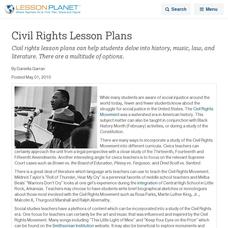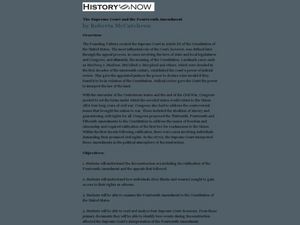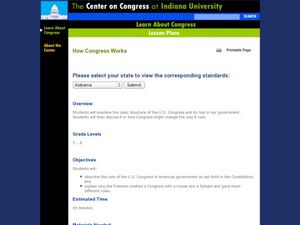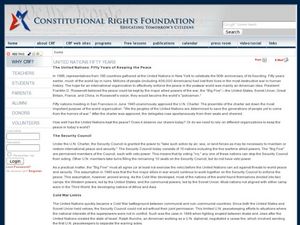Curated OER
Civil Rights Lesson Plans
Civil rights lesson plans can help students delve into history, music, law, and literature. There are a multitude of options.
Curated OER
The Federalist Debates: Balancing Power Between State and Federal Governments
Young scholars examine the pros and cons of state sovereignty vs. federalism, as argued by the Founding Fathers. They identify the basic positions of each side, complete a worksheet, and write a persuasive essay arguing for Jefferson or...
Curated OER
An Empire in the Balance
Eleventh graders investigate the role of New York state during the American Revolution. In small groups, they research a particular region within colonial America, analyze primary source documents, complete Document Analysis Sheets, and...
Curated OER
Discovering American Symbols
Help youngsters get to know their states and capitals, explore their own country, and study American symbolism. They take a "trip" across America collecting symbols, images, and information about each state as they go (through text and...
Curated OER
The Two-Party System: Chapter 5
Guide your students' reading with this worksheet. Included are five matching and five multiple choice questions focused on aspects of the two-party system employed in the United States. Use as a quiz, guided reading questions, or homework.
Curated OER
Defending the Homeland--The Alien and Sedition Acts of 1789
Students explore that there have been times during the history of the US when ,in response to real and perceived threats, both domestic and foreign, our country has responded by passing legislation. Students trace the fundamental rights...
Curated OER
The Civil War
Although we currently focus on Abraham Lincoln's positive contributions in creating a more equal society, the truth is that Lincoln was actually a controversial character in his time! After studying the Civil War, give your high...
Curated OER
The Perfect President
Young scholars advertise for the perfect president. In this presidential duties lesson, students determine the attributes that the ideal president should have and then write job descriptions for the role.
University of Arkansas
Assessment and Discussion
"Without concerned citizen action to uphold them (human rights) close to home; we shall look in vain for progress in the larger world. . ." Eleanor Roosevelt's comment is used to set the stage for the conclusion of a five-lesson unit...
PBS
President Theodore Roosevelt: Foreign Policy Statesman or Bully?
Can a negative perception of a president's foreign policy harm his or her historical legacy? A project that winds the clock back to the date of Theodore Roosevelt's death puts students at the editorial desk of a fictional newspaper....
Center for Civic Education
The Power of Nonviolence: Rosa Parks: A Quest for Equal Protection Under the Law
Teach young historians about the historical legacy of Rosa Parks with a multi-faceted lesson plan. Pupils follow stations and use journals to explore prominent events, analyze primary resource documents, and engage in interesting...
National Endowment for the Humanities
Cultural Change
High schoolers research the passage of the 19th Amendment as an illustration of the mutual influence between political ideas and cultural attitudes. They also read the Seneca Falls Declaration and explore the cultural shifts it both...
Curated OER
The Supreme Court: The Judicial Power of the United States
Students learn basic facts about the Supreme Court by examining the United States Constitution and one of the landmark cases decided by that court.
Curated OER
Stories of Freedom and Justice: Learning Resources
Students are introduce to the topic of nonviolence and civil rights by watching a video. For this stories of freedom lesson, students examine the Supreme Court's role in interpreting the U.S. Constitution. Students analyze how conflict...
Curated OER
In Congress Assembled: Continuity and Change in the Governing of the United States
Students interpret history using primary resources and secondary research. The Constitution is examined and changes are explained within the time period they were made.
Curated OER
The Supreme Court and the Fourteenth Amendment
Students examine the ratification of the Fourteenth Amendment. For this Reconstruction Era lesson, students read and analyze 4 Supreme Court decisions regarding the Fourteenth Amendment and determine how the decisions impacted citizen...
Deliberating in a Democracy
Violent Video Games
High schoolers examine violence in video games. In this American history instructional activity, learners read an article on the link between video games and violence. High schoolers respond to discussion questions and debate the topic.
Curated OER
How Congress Works
Students describe role of the U.S. Congress in American government as set forth in the Constitution, and explain why the Framers created a Congress with a House and a Senate and gave them different roles.
Curated OER
The Gas Laws
A couple of gas law charts and the history of the gas laws constitute this presentation. Notes are included for the slide that illustrates how to perform gas law calculations. This is a simple collection, a visual aid enhance to your...
Curated OER
Leonardo da Vinci: Creative Genius
Students discuss how Leonardo Da Vinci reflected the spirit of the Renaissance. They examine his achivements and explain the significance of his notebooks. They write essays on what constitutes a "rRenaissance man."
Curated OER
The United Nations: Fifty Years of Keeping the Peace
Students examine the work of the United Nations. For this United Nations lesson, students listen to their instructor present a lecture regarding the history of the United Nations. Students respond to discussion questions pertaining to...
Curated OER
Three Visions for African Americans
Students consider the plight of African Americans in post-Reconstruction America. In this African American history lesson, students discover the visions of African American leaders Booker T. Washington, W. E. B. Du Bois, and Marcus...
Curated OER
Remembering the Forgotten War
Ninth graders examine the major events and significance of the Korean War, including U.S. involvement in the war. In this World History instructional activity, 9th graders read primary source materials to understand the political,...
Curated OER
Firestorms: The Bombing of Civilians in World War II: War, Ethics, Guernica, Precision Bombing
Pupils explore the history, rationale and ethics of civilian bombing in times of war. They consider war strategy, the laws and conventions of war and international implications.
Other popular searches
- Constitution History Outline
- The Constitution History
- Canada Constitution History
- Us History Constitution
- U.s. History Constitution

























